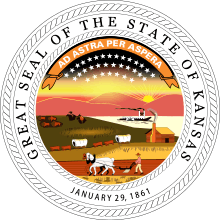Wyandotte Constitution
The Wyandotte Constitution admitted Kansas as a free state, although it was not the first choice. There were four constitutions made for Kansans to vote on, the Topeka Constitution, the Leavenworth Constitution, the Lecompton Constitution and the Wyandotte Constitution. After voting took place in a climate of intimidation and open violence, the Lecompton Constitution was voted to be the constitution of Kansas, and would have made Kansas a slave state. All that was left to do was send it to Washington D.C. After a rigorous national debate over the topic, it was overruled. The people of Kansas were set to vote on the four constitutions again. After another voting session, The Wyandotte Constitution was to be voted as the constitution of Kansas. Washington approved it and it was set, The Wyandotte Constitution was the constitution for Kansas.
Adoption
The Wyandotte Constitution was approved in a referendum by a vote of 10,421 to 5,530 on October 4, 1859.[1] In April, 1860, the United States House of Representatives voted 134 to 73 to admit Kansas under the Wyandotte Constitution; however, there was resistance in the United States Senate. As 11 slave states seceded from the Union, their senators left their seats and on January 21, 1861, the Senate passed the Kansas bill.[1] The admission of Kansas as a free state became effective January 29, 1861.[1]
Terms
The constitution settled the terms of Kansas' admission to the United States, particularly establishing that it would be a free state rather than a slave state.[2] The constitution represented a pragmatic compromise over hotly contested issues: it rejected slavery and affirmed separate property rights for married women and their right to participate in school elections, but also denied universal suffrage for women, blacks, and Indians.[2]
Solon O. Thacher of Lawrence gave a rousing speech opposing the exclusion of African-Americans from Kansas. The motion to exclude was defeated because all the Democrats and a few of the Republicans favored the exclusion.[3]
Another issue delegates considered was that of women's rights. Clarina Nichols, social activist and associated editor of Quindaro Chindowan, an abolitionist newspaper, was asked to address the convention. As a result of her efforts, women gained the rights to own property and to participate in school district elections. In addition, the constitution assured that the state would provide for women's equal rights "in the possession of their children." [4][5]
The previous proposed state constitutions were the Topeka Constitution of 1855, the Lecompton Constitution of 1857 and the Leavenworth Constitution of 1858.[2]
Amended many times (including a universal suffrage amendment in 1912), the Wyandotte Constitution is still the constitution of Kansas.[2]
Slavery is prohibited: "SEC. 6. There shall be no slavery in this State, and no involuntary servitude, except for the punishment of crime, whereof the party shall have been duly convicted."[2]
Preamble
We, the people of Kansas, grateful to Almighty God for our civil and religious privileges, in order to insure the full enjoyment of our rights as American citizens, do ordain and establish the Constitution of the State of Kansas, with the following boundaries, to wit: Beginning at a point on the western boundary of the State of Missouri, where the thirty-seventh parallel of north latitude crosses the same; thence running west on said parallel to the twenty-fifth meridian of longitude west from Washington; thence north on said meridian to the fortieth parallel of north latitude; thence east on said parallel to the western boundary of the State of Missouri; thence south with the western boundary of said State to the place of beginning.[6]
Kansas's constitution is the only state constitution to attempt to recognize "civil privileges" through "Almighty God" distinct from rights of citizens of the United States.[7] The preamble also conflates "America" with "United States" in its reference to seeking "to insure the full enjoyment of our rights as American citizens" rather than citizens of the United States.[7]
References
- 1 2 3 "Kansas Constitutions." KSHS.org. Kansas Historical Society.
- 1 2 3 4 5 Buescher, John. "With or Without Slavery." TeachingHistory.org. Roy Rosenzweig Center for History and New Media at George Mason University. Retrieved 2 September 2011.
- ↑ Few Republicans and All Democrats favored Exclusion Archived June 8, 2013, at the Wayback Machine.
- ↑ Clarina Nichols
- ↑ KSHS Constitution
- ↑ Preamble Accessed 13 October 2013
- 1 2 "References to "God" in State Constitution". ProCon.org. 24 October 2008. Retrieved 5 April 2013.
Sources
- Kansas State Historical Society
- Wilder, D.W., "The Annals of Kansas". 1886.
- William G. Cutler, "History of the State of Kansas" 1883
- Greenpapers: Four Constitutions
